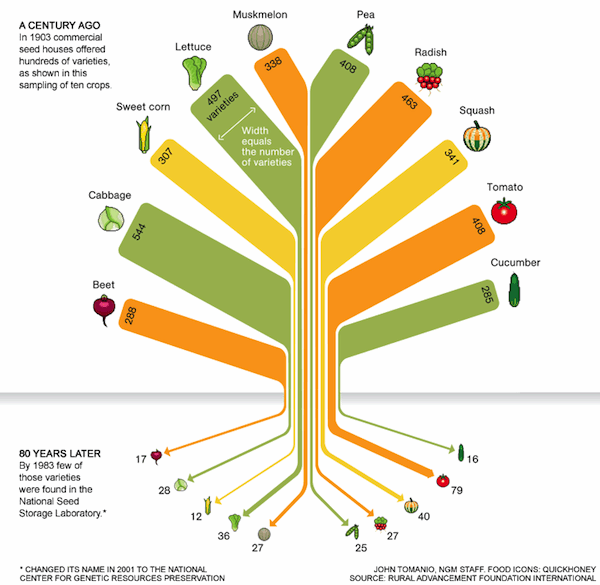A group of students in Canada just demonstrated the importance of seed saving seed as they grew a squash from 800 year old seeds.
During a dig on First Nations land in Wisconsin, archeologists found a small clay vessel of seeds. Canadian Mennonite University gave the seeds to students in Winnipeg, who planted them and successfully grew the unlikely squash. The students plan to save the seeds of the squash, which was thought to be extinct, and grow more. Their goal is to never let that variety go extinct again.
The squash is a reminder that seeds are a commons that belong to everyone, and that they depend on all of us to protect and support them. Brian Etkin, coordinator of the Garden of Learning in Winnipeg, reflects on the significance of the squash saying, "This squash is representative of a tribe, of a large community, and everybody in that community having a place, and food being a right of citizenship."

Students plan to save the seeds and grow more of the "extinct" squash.
In the last 100 years, our seed variety has been decimated by the privatization of seeds—from growing only high-yield, commercially-viable crops, to the attack on seed sharing libraries, to the takeover of our food system by agrochemical companies. As the following National Geographic infographic shows, an estimated 93 percent of the varieties we had in 1903 have gone extinct.

As Mother Earth News reports, “When you save your own seeds, you are joining a chain of farmers, gardeners and seed savers that dates back to the Stone Age. All domestic crops were once wild plants that early humans selected to feed themselves or, later, their livestock.”
A few reasons they provide for saving seeds are:
- Money Savings. Every time you buy a seed variety, you invest in your future.
- Seed Security. Hundreds of excellent plant varieties have been discontinued as big corporations have consolidated the seed industry and focused on more profitable hybrids. If you save your own seed, however, you control the supply.
- Regional Adaptation. This is where saving vegetable seeds can get exciting. Most commercially available seed has been selected because it performs fairly well across the entire country if given synthetic fertilizers…When you save seed from the best-performing plants grown on your own land and with your unique cultural conditions, you gradually develop varieties that are better adapted to your soil, climate and growing practices.
- Consistent Quality. To keep their prices competitive when producing open-pollinated (OP) seed crops, large seed suppliers rarely “rogue” the fields to pull out inferior or off-type plants.
- The Joy of Learning. Some people are drawn to the science of seed saving because they want to take their gardening experience to a higher level. The more seeds you save, the more you inevitably learn about botany and the plant kingdom.
- Explore Heirloom Varieties. Some folks like to grow heirloom varieties because doing so gives them a connection to our garden heritage.
- Influence Crop Traits. Gene pools are incredibly elastic. By carefully observing your plants, you can save seed from those plants that best meet your needs for germination, ripening time, yield, specific fruit shape, flavor, storage qualities, less seediness, better disease resistance, bloom color, or other unique traits within the variety. With time, most of the plants you grow will have your desired traits.
Want to show your support of seed saving and seed sharing? Join the movement and sign the Seed Matters petition, a partnership between Shareable, the Sustainable Economies Law Center, Richmond Grows Seed Lending Library, Seed Savers Exchange, and Greenhorns.
##
Photos: APTN News. Follow @CatJohnson on Twitter









